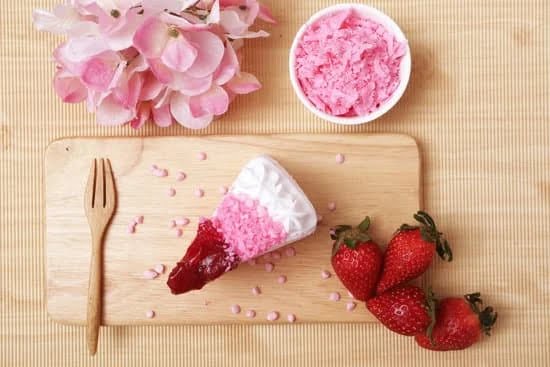Are you wondering how to decorate a cake with fruit? The use of fresh fruit as cake decoration has become increasingly popular in recent years, adding a beautiful and natural touch to any baked creation.
From classic designs to modern creations, incorporating fruit into cake decorating has become a popular trend that continues to grow. With its roots in traditional culinary practices, the use of fruit as cake decoration has evolved over time, resulting in stunning and delectable designs that enhance the visual appeal and flavor profile of cakes.
The history of using fruit as cake decoration dates back centuries, with the earliest records showing evidence of fruits being used to adorn celebratory desserts. Today, this age-old tradition has been reimagined and embraced by bakers and pastry chefs around the world, leading to an exciting array of creative possibilities for decorating cakes with fruit.
Whether you are looking to add a pop of color or a burst of freshness to your baked goods, using fruit as a decorative element can elevate your cakes to new heights.
In this article, we will explore everything you need to know about decorating cakes with fruit. From selecting the best fruits for your design to preparing and arranging them on your cake, we will provide you with expert tips and techniques for creating visually stunning and delicious fruit-decorated cakes.
Whether you are a professional baker or an aspiring home chef, this comprehensive guide will equip you with the knowledge and inspiration needed to showcase your creativity through beautifully decorated cakes featuring fresh fruit.
Types of Fruit That Work Best for Decorating Cakes
When it comes to decorating cakes with fruit, choosing the right type of fruit is essential for achieving a visually appealing and delicious result. Certain fruits work better than others when it comes to cake decoration, and it’s important to consider factors such as flavor, texture, and color coordination. Here are some types of fruit that work best for decorating cakes:
- Berries: Berries such as strawberries, blueberries, raspberries, and blackberries are popular choices for decorating cakes due to their vibrant colors and sweet flavor. They can be used whole, sliced, or arranged in decorative patterns.
- Citrus fruits: Citrus fruits like oranges, lemons, and limes add a pop of bright color and tangy flavor to cakes. Thin slices or zest can be used as garnishes or decorations.
- Tropical fruits: Exotic fruits like kiwi, mango, pineapple, and passion fruit can add a tropical touch to cake decorations. Their unique flavors and bold colors make them stand out on cakes.
- Stone fruits: Fruits like peaches, plums, cherries, and apricots work well for decorating cakes thanks to their juicy flesh and rich colors. They can be used fresh or as compotes for fillings or toppings.
When selecting fruits for cake decoration, it’s important to consider the overall flavor profile of the cake as well as the design aesthetic. For example, a light and fluffy lemon cake may benefit from the addition of citrus fruits for a refreshing burst of flavor and color. On the other hand, a decadent chocolate cake might be complemented by the rich sweetness of berries or stone fruits.
In addition to considering flavor and color coordination, it’s also important to choose fruits that are in season for the freshest taste and appearance. By selecting the best types of fruit for decorating cakes, you can elevate your creations with beautiful natural accents that are sure to impress both visually and gastronomically.
Preparing the Fruit for Cake Decoration
Washing and Preparing the Fruit
Before using fruit as cake decoration, it is essential to properly wash and prepare the fruit. Start by gently washing the fruit under running water to remove any dirt or residue. After washing, pat the fruit dry with a paper towel to ensure that it is completely dry before placing it on the cake. Once dry, carefully cut the fruit into slices, wedges, or shapes as needed for your chosen cake design.
Maintaining Freshness and Color
To ensure that the fruit remains fresh and vibrant on the cake, there are a few tips to keep in mind. If possible, prepare the fruit for decoration shortly before serving the cake to maintain its freshness. Additionally, consider lightly brushing the cut surfaces of fruits that oxidize quickly, such as apples or pears, with lemon juice to prevent browning. For berries and other delicate fruits, handle them with care to avoid bruising or damaging their appearance.
Enhancing Flavor and Appeal
In addition to preparing the fruit for visual appeal, consider ways to enhance the flavor of the overall cake. Infusing simple syrup with complementary flavors and brushing it onto the prepared fruit can add an extra layer of taste and elevate the overall dessert experience.
Experiment with different flavor combinations to complement both the cake and the fresh fruit decorations for a truly delightful treat. By taking these extra steps in preparing and enhancing the fruit for cake decoration, you can ensure a visually stunning and delicious final result that will impress both visually and in taste.
Techniques for Arranging Fruit on Cakes
Decorative Patterns and Arrangements
When it comes to decorating cakes with fruit, there are countless ways to arrange the fruit to create visually appealing designs. Some popular decorative patterns and arrangements include concentric circles of sliced fruit, evenly spaced rows of berries, or a cascading effect from the top of the cake. Experimenting with different patterns can add depth and dimension to the cake, creating a stunning visual impact.
Creating Visually Appealing Designs
One effective technique for arranging fruit on cakes is to create contrast and balance. This can be achieved by using a variety of colors, shapes, and sizes of fruit. For example, layering slices of kiwi with halved strawberries can create a vibrant and eye-catching design. Additionally, incorporating different textures such as smooth berries and juicy citrus fruits can add interest to the overall look of the cake.
Tips for Creating Stunning Fruit Decorations
To ensure that your fruit decorations stand out on the cake, consider elevating them using different techniques. For example, arranging fruit in a decorative ring around the perimeter of the cake or creating a focal point in the center can draw attention to the fruit decoration. Using edible flowers or herbs alongside the fruit can also enhance the overall aesthetic appeal of the cake.
By employing these techniques for arranging fruit on cakes, you can create beautiful and enticing designs that not only look visually stunning but also add delicious flavors to your cakes. Mastering these techniques will give you all you need to know about how to decorate a cake with fruit for any occasion.
Using Fruit in Fillings and Frostings
Incorporating fruit into cake fillings and frostings is a delicious way to add flavor, moisture, and a pop of color to your baked creations. Whether you prefer the natural sweetness of berries, the tartness of citrus fruits, or the tropical taste of mangoes and pineapple, there are endless options for creating mouth-watering fruit fillings and frostings for your cakes.
When deciding on the type of fruit to use in your fillings and frostings, consider the flavor profile of your cake. For example, lemon or lime zest can add a bright, citrusy flavor to a vanilla or coconut cake, while raspberry or strawberry puree can complement a rich chocolate or decadent red velvet cake. Additionally, incorporating fruit into your fillings can also add moisture to your cakes, keeping them from drying out.
One popular way to incorporate fruit into fillings is by making fruit compotes or purees. These can be made by cooking down fresh fruits with sugar until they form a thick syrup-like consistency. Once cooled, these compotes can be spread between cake layers or used as a filling in cupcakes and pastries.
Additionally, using fruit juice in place of some of the liquid in frosting recipes can infuse it with natural flavors and add a hint of color. For example, using freshly squeezed orange juice in buttercream frosting will create a fragrant and vibrant topping for your desserts.
Experimenting with different combinations of fruits and flavors can result in unique fillings and frostings that elevate your cakes to new heights. From classic pairings like strawberries and cream to more innovative combinations such as blueberry-lavender buttercream, the possibilities are endless when it comes to using fruit in fillings and frostings for decorating cakes.
By utilizing fruit in both the filling and frosting components of a cake, bakers have the opportunity to surprise their guests with unexpected bursts of flavor that perfectly complement each slice. The next time you bake a cake, consider how you can use fresh fruits creatively not only as decoration but also as an integral part of the overall taste experience.
Tools and Equipment Needed for Decorating Cakes With Fruit
When it comes to decorating cakes with fruit, having the right tools and equipment is essential for achieving a beautiful and professional-looking result. There are several key items that can make the process of working with fruit as cake decorations much easier and more effective.
One essential tool for decorating cakes with fruit is a good quality paring knife or fruit knife. This will allow you to cleanly and precisely cut the fruit into the shapes and sizes needed for your design. A sharp knife will also help in maintaining the integrity of the fruit, preventing it from becoming mushy or bruised during the cutting process.
In addition to a sharp knife, having a set of decorative cake stencils can add an extra level of creativity to your fruit-decorated cakes. Stencils can be used to create intricate designs using powdered sugar or cocoa powder, adding a visually stunning element to your cake decorations.
Another important piece of equipment for decorating cakes with fruit is a set of offset spatulas. These versatile tools are perfect for spreading frosting or ganache evenly across the surface of the cake, as well as delicately placing and arranging pieces of fruit on top of the cake.
For those who are looking to take their fruit decorating skills to the next level, investing in specialty tools such as flower cutters or shaping molds can open up a world of creative possibilities. These tools can be used to create intricate floral designs using fruits like strawberries and kiwi, adding an elegant and sophisticated touch to your cake decorations.
By using these essential tools and equipment, along with a healthy dose of creativity and imagination, anyone can learn how to decorate a cake with fruit like a pro. Whether you’re a beginner baker or an experienced pastry chef, having the right tools at your disposal can make all the difference in creating stunning and delicious fruit-decorated cakes.
Tips for Avoiding Common Mistakes When Decorating Cakes With Fruit
Decorating cakes with fruit can add a fresh and vibrant touch to any dessert. However, there are common mistakes that can occur when using fruit as cake decorations. By being aware of these pitfalls and knowing how to avoid them, you can ensure that your fruit-decorated cakes turn out visually stunning and delicious.
One common mistake when decorating cakes with fruit is not properly preparing the fruit. It’s important to wash the fruit thoroughly and remove any stems or pits before using them for decoration. Additionally, make sure to dry the fruit completely to prevent excess moisture from affecting the cake’s texture or appearance.
Another mistake to avoid is using overripe or underripe fruit. Overripe fruit can be too soft and juicy, which may cause it to slide off the cake or release excess moisture onto the frosting. On the other hand, underripe fruit may not have optimal flavor or sweetness. Selecting fruits that are at their peak ripeness will ensure that they not only look beautiful on the cake but also taste delicious.
Additionally, it’s essential to consider the placement of the fruit on the cake. Placing heavy or watery fruits directly onto a delicate frosting can cause them to sink or bleed into the frosting, resulting in a messy appearance. Instead, consider using a barrier such as a layer of whipped cream or frosting between the cake and the fruit.
By being mindful of these common mistakes and following best practices for decorating cakes with fruit, you can create visually appealing and mouthwatering desserts that are sure to impress your guests. With proper preparation, selection, and placement of fruits, you can elevate your cake decorating skills and add a delightful touch of natural beauty to your creations.
Inspiration and Ideas for Fruit Decorated Cakes
When it comes to decorating cakes with fruit, the possibilities are endless. From simple and elegant designs to intricate and vibrant creations, using fresh fruit as a cake decoration can add a unique and refreshing touch to any dessert. Whether you are looking for inspiration for your next baking project or simply want to explore different ideas for fruit-decorated cakes, this section will provide you with a wealth of imaginative concepts and tips for creating stunning confections.
One popular option for using fruit as cake decorations is to create beautiful floral arrangements. By carefully slicing and arranging the fruit in petal-like shapes, you can mimic the look of delicate flowers on top of your cake.
Consider using a variety of fruits such as strawberries, kiwi, and mango to achieve a colorful and visually striking effect. You can also complement the fruit flowers with edible leaves made from mint or other leafy greens for an added touch of realism.
Another idea for incorporating fruit into cake decoration is to create geometric designs or patterns. Using fruits like sliced citrus fruits or berries, you can arrange them in neat rows or intricate patterns to add a modern and artistic flair to your cake. Consider creating bold stripes, chevron patterns, or even polka dot designs with carefully placed fruit slices for an eye-catching visual appeal.
For a more whimsical and playful approach to decorating cakes with fruit, consider creating themed designs based on seasonal fruits or special occasions. For example, you could decorate a summer-themed cake with an assortment of tropical fruits like pineapple, passionfruit, and dragonfruit for a vibrant and summery aesthetic. Alternatively, you could use heart-shaped fruits like strawberries and raspberries to create a romantic Valentine’s Day-inspired design.
| Fruit Decoration Idea | Description |
|---|---|
| Fruit Flower Arrangements | Create delicate floral designs using sliced fruit pieces. |
| Geometric Patterns | Arrange fruit slices in neat rows or patterns for a modern look. |
| Seasonal Themes | Create themed designs based on seasonal fruits or special occasions. |
Conclusion and Final Tips
In conclusion, decorating cakes with fruit is a versatile and visually appealing trend that has gained popularity in recent years. The use of fresh fruit as cake decorations brings a pop of color, natural sweetness, and a touch of elegance to any dessert. From strawberries and raspberries to kiwi and mango, there are countless options for incorporating fruit into cake designs.
When it comes to preparing the fruit for cake decoration, it’s essential to wash, cut, and arrange them properly to maintain their freshness and vibrant colors. Different types of fruits work best for different cake flavors and designs, so selecting the right fruits is crucial for achieving the desired visual impact.
Incorporating fruit into cake fillings and frostings adds an extra layer of flavor and freshness to the dessert. Whether it’s adding a layer of mixed berries between cake layers or creating a glossy fruit glaze on top of the cake, there are numerous creative ways to enhance the taste and appearance of a fruit-decorated cake.
In addition to showcasing stunning examples of fruit-decorated cakes for inspiration, it’s important to experiment with different decorative patterns and arrangements using fruit on cakes. With the right tools and equipment, along with careful attention to detail, anyone can learn how to decorate a cake with fruit effectively and create visually stunning desserts that are sure to impress any crowd.
Frequently Asked Questions
How Do You Decorate a Cake With Fruit?
Decorating a cake with fruit can be done in various ways. One option is to arrange whole or sliced fruits like berries, kiwi, or peaches on top of the frosted cake. Another method is to create a fruit glaze using melted jelly and brush it over the arranged fruit to give it a shiny finish.
How Do You Top a Cake With Fresh Fruit?
Topping a cake with fresh fruit can add a pop of color and freshness. The key is to carefully select ripe fruits that are firm enough to hold their shape once placed on top of the cake. Arranging them in an aesthetically pleasing manner can also enhance the overall presentation of the dessert.
How Do You Keep Strawberries From Getting Soggy on Cakes?
To prevent strawberries from becoming soggy when used as a cake topping, it’s important to prepare them properly. After washing and patting them dry, slicing the strawberries just before placing them on the cake helps maintain their freshness and texture. Additionally, lightly dusting the sliced strawberries with sugar can help draw out excess moisture and prevent sogginess.

Welcome to our cake decorating blog! My name is Destiny Flores, and I am the proud owner of a cake decorating business named Cake Karma. Our mission is to provide delicious, beautiful cakes for all occasions. We specialize in creating custom cakes that are tailored specifically to each customer’s individual needs and tastes.





